FUBU, established in 1992 by Daymond John and his partners, emerged as a fashion phenomenon through its innovative marketing strategies and strategic celebrity endorsements. The brand became a cultural icon by deeply connecting with urban culture, achieving peak sales exceeding $350 million by 1998. FUBU's diverse range of products, including apparel and accessories, allowed it to seamlessly integrate into the hip-hop lifestyle. Despite facing challenges in the late 2000s that led to a decline in market presence, recent comeback strategies have centered around nostalgia and collaborative efforts. FUBU's ongoing commitment to cultural representation continues to shape its brand image, ensuring its lasting legacy and influence in the fashion industry. Explore further, and you will discover even more about FUBU's impact on fashion and culture.
Founders of FUBU

FUBU's inception in 1992 marked a critical turning point in the fashion industry, driven by the vision and collaboration of its founders: Daymond John, Keith Perrin, J. Alexander Martin, and Carl Brown. As a FUBU founder, Daymond John demonstrated exceptional entrepreneurial skills, transforming a modest $40 budget into a staggering $6 billion brand. His innovative marketing strategies resonated deeply with urban consumers, paving the way for FUBU's evolution.
Keith Perrin played an essential role in brand development and expansion, contributing greatly to FUBU's financial growth and sustainability. His insights into market trends helped FUBU carve a niche within the competitive landscape. Meanwhile, J. Alexander Martin focused on originality and cultural relevance, ensuring the brand's image aligned with the values of its target audience. His marketing strategies effectively connected with urban consumers, enhancing FUBU's appeal.
Carl Brown, serving as FUBU's Executive Producer, broadened the brand's influence beyond fashion. By releasing the highest-selling urban music compilation album, he showcased the synergy between music and apparel, further solidifying FUBU's place in popular culture. Collectively, these founders shaped a powerful legacy that continues to inspire entrepreneurs today.
The Rise of FUBU
A remarkable ascent in the fashion industry began with FUBU, whose founders tapped into the essence of urban culture to create a relatable sportswear line. You'll find that the brand's rise was marked by strategic moves that elevated its status and recognition. One pivotal moment came when LL Cool J donned FUBU clothing in a Gap commercial, instantly boosting its visibility.
Several key factors contributed to FUBU's extraordinary growth:
- Celebrity Endorsements: Leveraging influential figures helped FUBU capture attention.
- Strategic Partnerships: The collaboration with Samsung in 1995 led to significant investment and expansion.
- Community Engagement: FUBU connected with its audience, fostering loyalty and brand identity.
- Peak Sales: In 1998, the brand hit over $350 million in global sales, showcasing its appeal.
These elements collectively solidified FUBU's presence in the fashion market, transforming it into a cultural phenomenon. As you explore FUBU's journey, you'll see how it not only catered to a specific demographic but also reshaped urban fashion, making it a household name.
FUBU's Product Collection
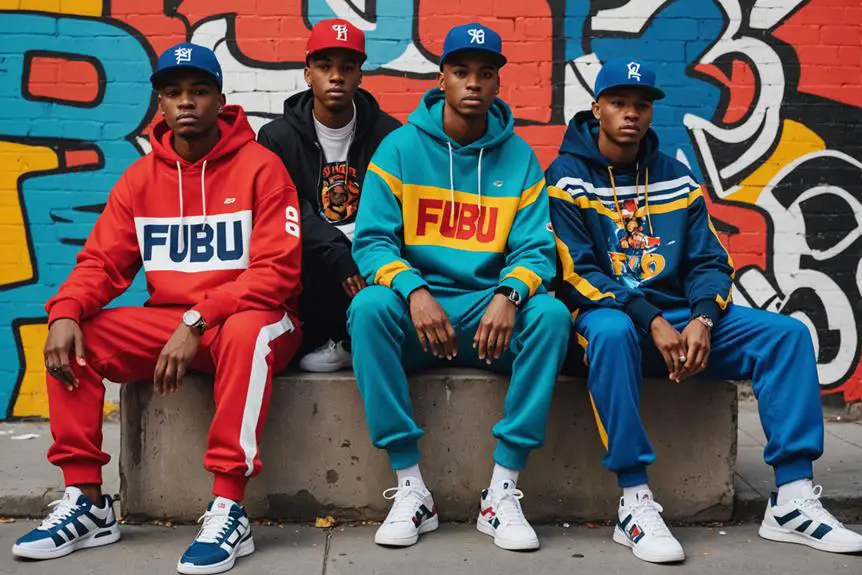
With an extensive array of products, FUBU has successfully carved out its niche in the urban fashion landscape. The brand's collection spans T-shirts, jerseys, caps, shoes, and denim jeans, all prominently adorned with the recognizable FUBU logo. This strong branding not only appeals to your sense of style but also fosters a sense of community and identity among wearers.
FUBU has expanded beyond casual wear to include specialized lines such as Platinum FUBU, footwear, intimate apparel, and activewear, catering to diverse consumer needs. A notable highlight is the Fat Albert line, which received approval from Bill Cosby, illustrating FUBU's ability to connect with cultural icons and trends.
Moreover, the brand doesn't shy away from formalwear; it offers suits and tuxedos, showcasing its versatility and commitment to providing options for various occasions. Importantly, many of FUBU's products are sourced globally, emphasizing its international reach and appeal. This strategic approach guarantees that FUBU remains relevant in the competitive fashion market, balancing streetwear roots with broader fashion aspirations, making it a brand that resonates with many.
FUBU Records History
Emerging from a strong foundation in urban fashion, FUBU expanded its influence into the music industry by establishing FUBU Records in 2001. The label aimed to bridge the gap between fashion and hip-hop culture, a move that underscored the brand's commitment to its roots. With a focus on promoting urban music, FUBU Records quickly made a name for itself.
- The label's debut release, "The Good Life," became the highest-selling urban music compilation in 2001.
- FUBU Records' second project, "All or Nothin" by 54th Platoon, charted on Billboard in 2003.
- Collaborating with Universal for music distribution allowed the label to expand its reach considerably.
- FUBU Records operated from 2001 to 2003, yet its impact on the urban music scene was notable.
Although FUBU Records only lasted a couple of years, its contributions highlighted the importance of music in FUBU's cultural narrative. By intertwining urban fashion with music, the label reinforced FUBU's identity and solidified its connection to the hip-hop community, making it a pivotal moment in the brand's history.
Cultural Impact in Media
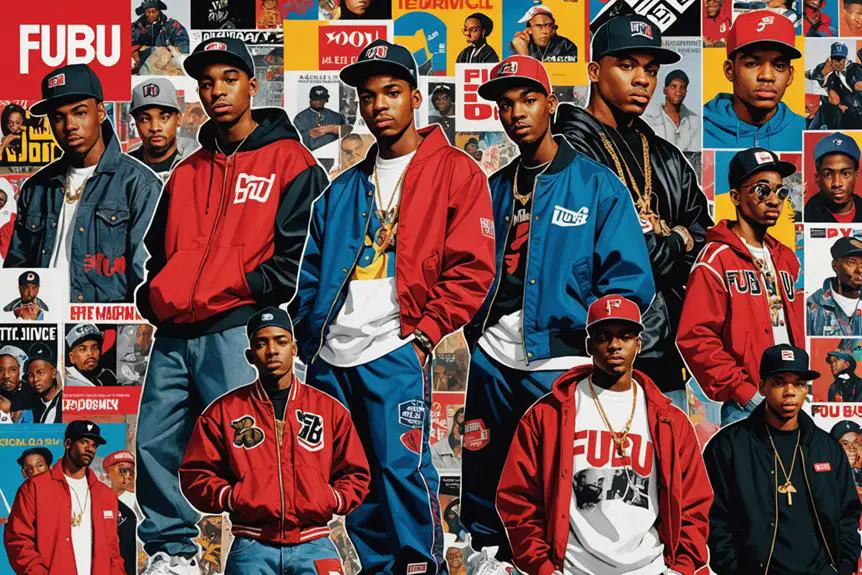
FUBU's cultural impact in media is undeniable, as the brand has woven its identity into the fabric of popular culture, particularly within the domain of hip-hop. When a FUBU shirt appeared prominently in the "Atlanta" episode titled "FUBU," it highlighted the brand's significance in contemporary fashion and sparked discussions about its influence on urban style. This moment exemplified how FUBU is not just a clothing line; it's a cultural symbol that resonates with the hip-hop community.
The brand has consistently reinforced its relevance through various product placements in television shows and films that celebrate hip-hop culture. By intertwining itself with the entertainment industry, FUBU has shaped perceptions of urban identity and style. Additionally, its collaboration with Puma in 2018 underscored its ongoing evolution within modern fashion narratives.
FUBU's legacy continues to thrive, as media discussions frequently reference its pivotal role in the evolution of streetwear. This emphasis on diversity and representation in the fashion landscape further cements FUBU's status as a cultural touchstone, making it an enduring icon in the world of media and beyond.
Collaborations and Partnerships
Collaborations and partnerships have played a pivotal role in FUBU's strategy to maintain its relevance in the ever-evolving fashion landscape. By aligning with other brands, FUBU not only reconnects with its heritage but also taps into new audiences.
Key collaborations include:
- Puma (2018): This partnership produced unique shoe offerings that fused FUBU's urban essence with Puma's athletic flair.
- Century 21 (2019): This collaboration aimed to enhance FUBU's retail presence, making its products more accessible to a wider customer base.
- Eye Candy Creations USA (2020): Together, they launched a line of sunglasses, expanding FUBU's product variety beyond apparel.
- Ongoing partnerships: FUBU has engaged with contemporary brands like Pyer Moss and Urban Outfitters, keeping the conversation alive in today's fashion discussions.
These strategic collaborations not only rejuvenate FUBU's brand image but also reflect its adaptability in a fast-changing market. Through these partnerships, FUBU continues to carve out its niche while appealing to both loyal fans and new customers, showcasing its commitment to innovation and community.
Challenges and Decline
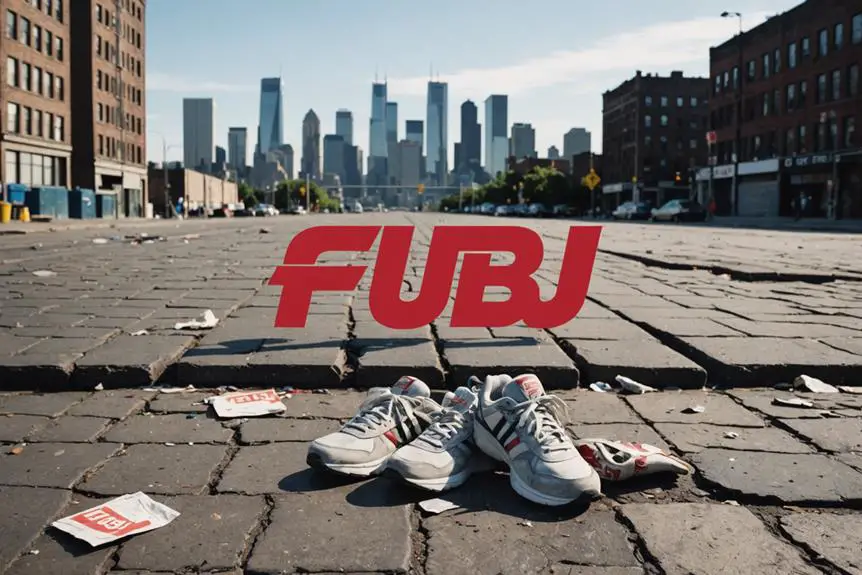
Throughout the late 2000s, FUBU faced a series of challenges that contributed to a notable decline in its market presence. One major issue was market oversaturation, which saw annual revenue plummeting to around $200 million by 2009. This decline was exacerbated by a strategic shift that focused on international markets, such as Europe and Asia. While this approach aimed to expand the brand's reach, it led to excess inventory in the U.S., negatively impacting financial performance.
Additionally, FUBU's prestige suffered considerably due to frequent clearance sales and discount retail placements. Such practices diminished its visibility and perceived value, making the brand appear less exclusive to consumers. As FUBU's visibility waned, it became increasingly detached from the fashion landscape, particularly among younger audiences. The brand's attempts to pivot toward an aging customer base while also courting the Gen-Z demographic proved challenging, as these younger consumers had developed a different relationship with hip-hop culture and streetwear. Overall, these interconnected challenges resulted in FUBU losing relevance, marking a difficult chapter in its history.
Comeback Strategies
In an effort to reclaim its place in the fashion landscape, FUBU announced its return to the U.S. market in 2020, strategically targeting both nostalgia-driven older customers and the trend-savvy Gen-Z demographic. By capitalizing on the brand's rich heritage, FUBU aims to resonate with consumers who appreciate its roots in hip-hop culture while appealing to younger audiences who crave modern streetwear aesthetics.
FUBU's comeback strategy incorporates several key elements:
- Innovative Marketing Campaigns: Celebrating hip-hop culture to enhance brand visibility.
- Collaborations with Established Brands: Partnering with names like Puma and Century 21 to revitalize its image.
- Diversified Product Offerings: Addressing shifting consumer preferences through varied styles and collections.
- Cultural Representation: Promoting inclusivity and relevance in today's fashion discussions.
Legacy and Influence
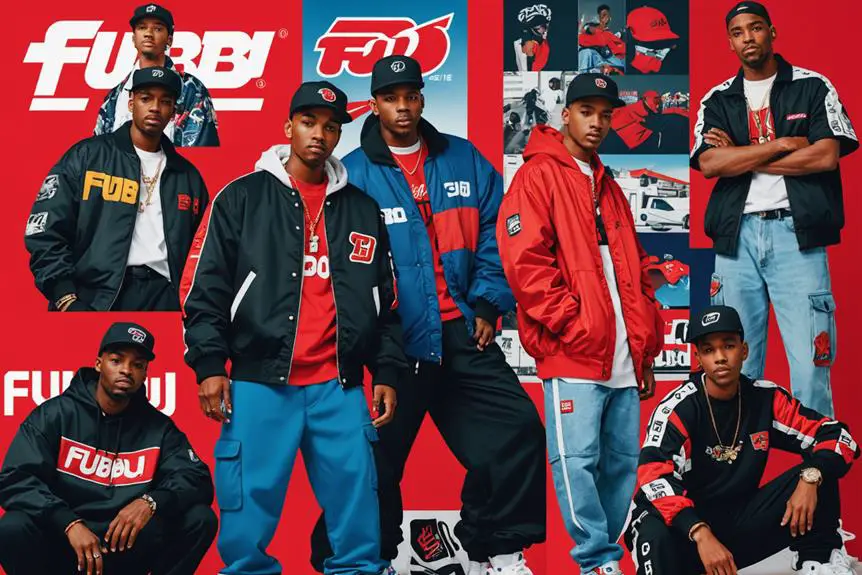
FUBU's influence on the fashion industry extends far beyond its initial rise in the 1990s. Founded on the mantra "For Us, By Us," FUBU emerged as a cultural phenomenon, grossing over $6 billion in retail sales. By collaborating with celebrities like LL Cool J, the brand greatly elevated its visibility, solidifying its position as a leader in urban streetwear. This strategic partnership not only increased sales but also established FUBU as an authentic voice within hip-hop culture.
FUBU's innovative marketing strategies, such as targeted community engagement and licensing deals with the NBA, forged a strong brand identity and deepened connections with its audience. Even when challenges arose in the early 2000s, FUBU's resurgence efforts, including the 2020 relaunch, reflect its adaptability and commitment to reconnecting with both older and younger customers.
Today, FUBU's legacy inspires aspiring entrepreneurs and fashion designers, showcasing the power of cultural representation and community-driven branding. By demonstrating that a brand can thrive by authentically connecting with its roots, FUBU continues to influence the fashion landscape, proving that its impact is as relevant now as it was in its heyday.
Frequently Asked Questions
What Is the Story Behind the FUBU Brand?
FUBU's story reflects a unique intersection of hip-hop culture and entrepreneurship. You'll find it embodies grassroots innovation, capturing the essence of community, while successfully steering through market dynamics and cultural shifts to redefine urban fashion's landscape.
Why Did FUBU Go Out of Style?
FUBU went out of style due to market oversaturation, lack of innovation, and ineffective marketing strategies. You might've noticed the brand's decline as consumer preferences shifted toward competitors, diminishing its relevance and visibility in the streetwear scene.
What Was the Impact of Fubu?
FUBU's impact reshaped urban fashion, promoting representation and empowerment. You see its influence in hip-hop culture and sports, while celebrity endorsements amplified brand awareness, creating a cultural phenomenon that resonates with communities and fashion today.
How Old Was Daymond John When He Started Fubu?
Daymond John was just 20 years old when he started FUBU in 1992. His youthful ambition and determination to create a brand that resonated with the African American community set the foundation for his entrepreneurial success.
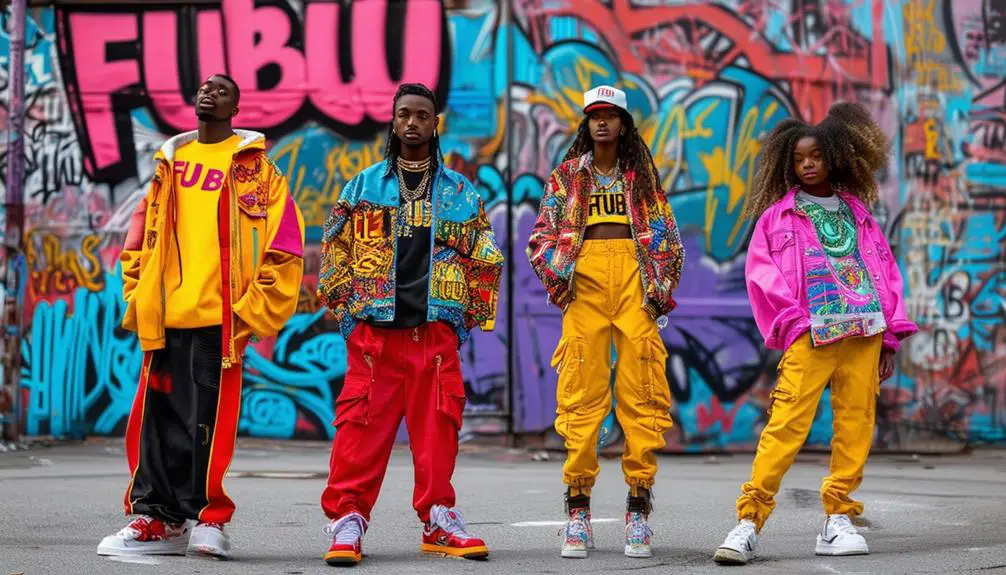



I blog frequently and I truly thank you for your information. Your article has really peaked my interest.
I am going to book mark your site and keep checking for new information about
once per week. I opted in for your Feed as well.
casino en ligne
bookmarked!!, I love your web site!
casino en ligne
An impressive share! I’ve just forwarded this onto a co-worker who has
been doing a little research on this. And he in fact ordered me dinner because
I found it for him… lol. So let me reword this…. Thank YOU for the
meal!! But yeah, thanx for spending time to talk about this topic here on your
website.
meilleur casino en ligne
Pretty nice post. I just stumbled upon your blog and wanted to say that I have truly enjoyed browsing your blog posts.
After all I’ll be subscribing to your feed and I hope you write again soon!
casino en ligne
It is perfect time to make a few plans for
the future and it’s time to be happy. I’ve learn this put up and if I may I
desire to counsel you few attention-grabbing issues
or suggestions. Maybe you could write subsequent articles relating to this article.
I wish to learn more things about it!
casino en ligne
Its like you read my mind! You appear to know so much about this, like you
wrote the book in it or something. I think that you can do with some pics to drive the
message home a bit, but instead of that, this is wonderful blog.
A great read. I will certainly be back.
casino en ligne
You really make it seem really easy together with your presentation however I find this topic to be really something that I think I might by no means understand.
It sort of feels too complex and extremely wide for me. I am
taking a look forward for your next put up, I will attempt to
get the hang of it!
casino en ligne francais
My brother recommended I might like this blog.
He was entirely right. This post truly made my day.
You can not imagine just how much time I had spent for this info!
Thanks!
casino en ligne francais
Admiring the time and effort you put into your
site and detailed information you provide. It’s nice to come across a blog every once in a while
that isn’t the same outdated rehashed information. Great read!
I’ve saved your site and I’m adding your RSS feeds
to my Google account.
casino en ligne
Write more, thats all I have to say. Literally, it seems as though you relied on the video to make your point.
You definitely know what youre talking about, why waste your intelligence on just posting videos to your weblog when you could be
giving us something informative to read?
meilleur casino en ligne
Your point of view caught my eye and was very interesting. Thanks. I have a question for you.
Thank you for your sharing. I am worried that I lack creative ideas. It is your article that makes me full of hope. Thank you. But, I have a question, can you help me?
I don’t even know how I ended up right here, but I believed this
post was once great. I do not realize who you might be but certainly you’re going to
a well-known blogger if you happen to are not already. Cheers!
Hello there! I could have sworn I’ve visited this blog before but after going through many of the articles I realized it’s new to me.
Regardless, I’m certainly delighted I stumbled upon it
and I’ll be book-marking it and checking back regularly!
It’s remarkable to visit this web page and reading the views of all colleagues on the topic of this post, while I am also eager of getting experience.
Thank you for your sharing. I am worried that I lack creative ideas. It is your article that makes me full of hope. Thank you. But, I have a question, can you help me?
I really like what you guys tend to be up too.
This type of clever work and reporting! Keep up the fantastic works guys I’ve included you guys to
blogroll.
https://vk.com/public211532114
I am sure this paragraph has touched all the internet people, its really really good paragraph on building up new website.
I was very pleased to uncover this page. I need to to thank you for your time for this particularly wonderful read!!
I definitely loved every part of it and i also have you book-marked to see new stuff in your blog.
I believe this is among the so much vital info for me.
And i’m satisfied reading your article. But want to remark on some general things,
The web site style is perfect, the articles is actually excellent : D.
Good job, cheers
Incredible! This blog looks exactly like my old one! It’s on a entirely different subject but it has pretty much the same page layout and design. Superb choice of colors!
???????????????????????????????????????????
When some one searches for his vital thing, thus he/she wants to be available that in detail, so that thing is maintained over here.
Amazing! Its genuinely awesome piece of writing, I have got much clear idea about from this piece of writing.
Blackburn vs Preston 2026 Championship 21:00 – Rovers favored! English football scores & betting buzz live now!